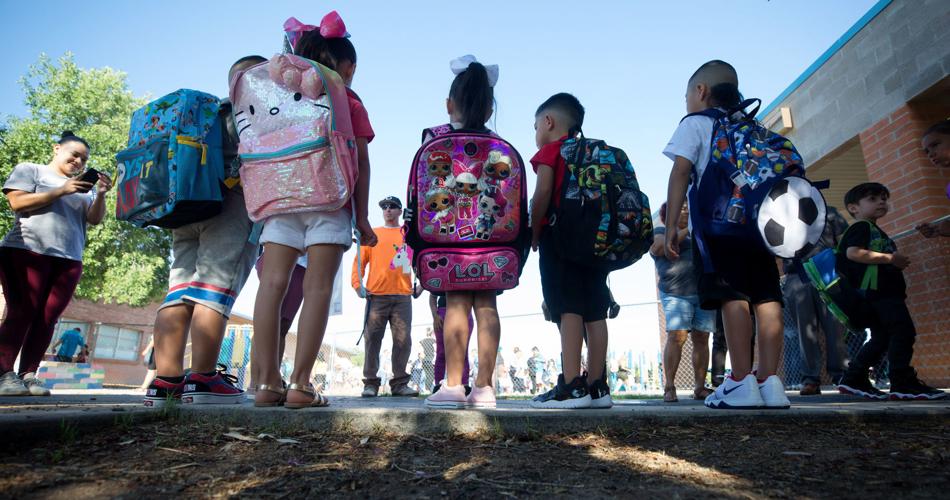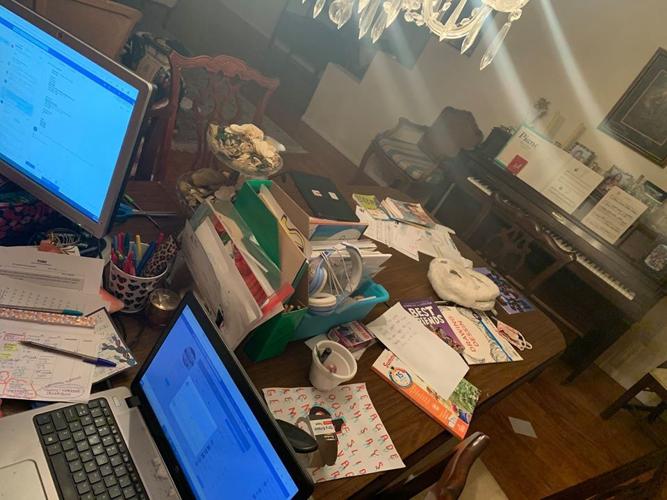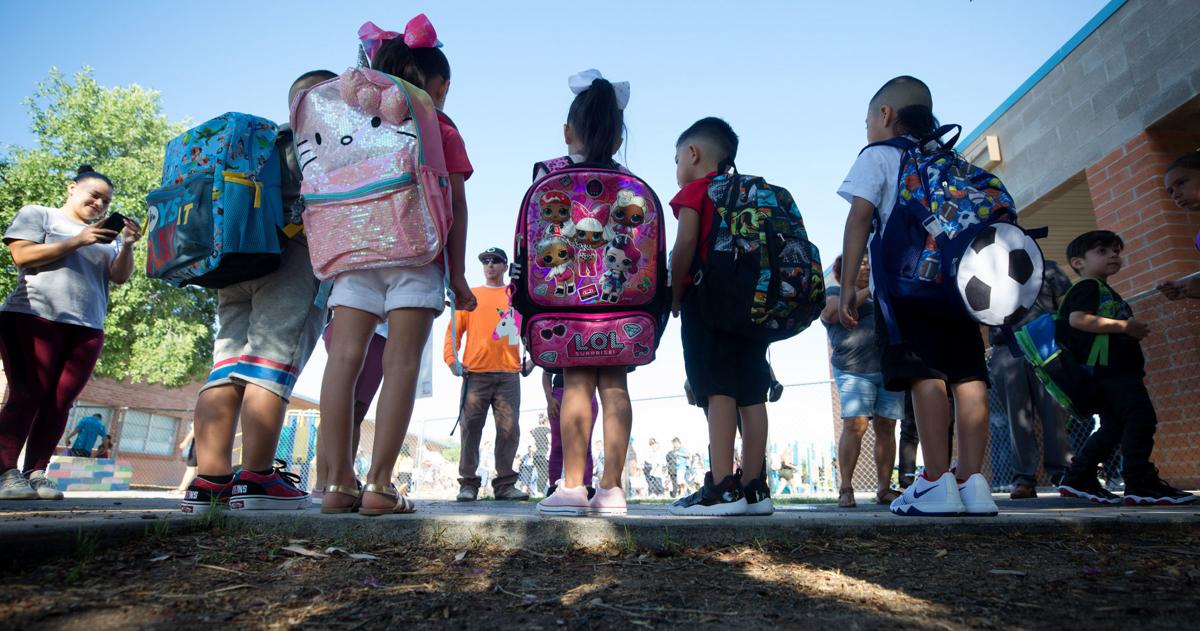Unusual times call for creative measures.
For some Tucson parents that means looking outside their circles to find other ways for their kids to interact with their peers and to get help with childcare or some extra support for remote learning during the pandemic.
These arrangements have different names: learning pods, pandemic pods, quaranteams, bubbles.
But the general idea is the same no matter what you call it — forming a small community of kids whose families share responsibilities; all agree to take the same safety precautions, minimizing their risk of exposure; and who agree on their goals for such a set up.
What this actually looks like varies. Some examples include: students setting up at one family's home and completing their virtual schoolwork in one place, a group of parents sharing hosting duties with kids rotating among different homes daily or weekly, getting kids together just to socialize or in some cases with families who have the means — hiring an in-home tutor or educator.
Tucson parents Joshua Mattson and Amanda Heffernan have two boys, ages 5 and 1. The youngest is in daycare, but they are hoping to find at least one other family to pod with so the 5-year-old can socialize and give the adults some dedicated time to focus on work and also to give Heffernan time to work on her dissertation.
Initially, they hoped to form a pod with their own friends, but their friends have kids of different ages or just different circumstances and they realized that wasn't going to work. Their eldest was set to start kindergarten this year, but they decided against having him complete kindergarten online and will hold him back a year, so they don't yet have a network of parent friends from school.
They turned to social media and created the Facebook group Tucson Remote Learning Pods and Co-Ops Support to help expand the search and help other parents looking to form their own pods.
"I think it’s a little easier sometimes with the older kids because they have their friends," Heffernan says. "It’s a little harder with a rising kindergartener because we’ve never even been at the school, so we don’t really know anybody yet in terms of trying to find people in his school."
The group has about 200 members so far and a few posts from parents looking to find other families whose children attend the same school, or who live in the same area.
While the couple sees how these arrangements can help parents who really need help with childcare or give their kids a chance to be among peers while minimizing risk as much as possible, they're also aware of how they can become exclusionary or contribute to inequity among families.
"Some of the concerns that I have with this whole pod idea is it kind of excludes parents that can’t take kids at their house for a day or full time," Heffernan says. "Also is everyone just gonna sort of pod up with people that are just like them? It kind of solidifies segregation in a way because we tend to be friends with people that are like us. One of the things that we were looking forward to sending our son to our neighborhood school was getting to know all the different kinds of families that might be outside of our normal bubble. But then most likely you’re going to do this with people you already know or trust for better or for worse."
She's also concerned about the advantages some families might be able to provide that are out of reach for others and she hopes the group doesn't become a space solely for parents to form groups supported by private teachers and tutors.
"I’m a little worried about the pods that can hire a tutor, the pods that can hire a teacher. It’s not fair that some people can do that and some people can’t," Heffernan says.
She sees ideas like one proposed by early childhood educators and advocates in San Francisco that calls for a publicly organized approach to forming pods as one way provide an equitable opportunity for all students, but with no such solution that exists they're making a go of it on their own.
Mattson and Heffernan are "in talks" with one family to see if they are a good fit for each other, and expect to have a meeting with them to discuss further later this week.
"I think one of the biggest things is just what everyone is comfortable with in terms of any other socializing that you might be doing. Are you seeing family? Grandparents? Other friends?," Heffernan, who works as a midwife at El Rio, says about the things that are up for discussion. "... I'm a healthcare provider so whichever family we would pod with would have to be comfortable with the fact that I go to the hospital to work and to a clinic."
Other considerations are learning what everyone hopes to get from the experience and what their education and parenting styles are.
"This family that we're chatting with, we both kind of agreed that while we want to do some letters and writing, the social emotional learning at this age is more important to us and we both saw eye-to-eye on that," Heffernan says. "We're not going to be obsessed with academics at kinder level, it's more about play."
Another Tucson mom, Marie DeGain is also hoping to form a pod so her 3-year-old son can find some playmates. His preschool closed in March and will remain closed at least until January. DeGain also has health issues that make her high risk, so being able to find a community while being able to manage the risk of exposure was important to her.
"He hasn't hugged anyone besides us since March so for little people it’s interesting," she says. "It’s not so much about school for us."
Ideally she'd like to find one to three other families to pod with. Like others, she tried to find families in her own circle but was unsuccessful.
"I don’t have my matches yet," she says. "Even my closest friends they weren’t good matches for me for a variety of reasons because maybe they have a baby in the house, kids of different ages, a variety of exposures."
To help in the search she created a Google form called Creative Child Care & School in Pandemic that she published this week and has been circulating in different neighborhood groups, and on social media.
The form has a pretty comprehensive questionnaire to help assess what families are looking for and are questions that DeGain thought through from her own questions she has for other potential pod families. There are questions about ages and grade levels, schedules, physical distancing and mask preferences, what risk/exposure levels families fall into, if kids are vaccinated, if parents want to hire someone to help with tutoring or caregiving and what their family's interests are.
DeGain plans to share the responses from the form in a weekly email to everyone who shared their information so they can initiate conversations from there.
"I’ll send some kind of next steps, considerations they might take, ways they might get to know each other in a virtual way before they decide if they are a good fit," she says.

Katie Sabel shared this photo of her workspace in the Facebook group she created to form a virtual village of parents and educators. She captioned it: "Welcome to the new 'normal' in school! None of us have all of the answers and what works for one may not for others, but if we bring our ideas together maybe... just maybe... we will survive!"
Katie Sabel, a mom to four school-age children who also works for Gridley Middle School as a curriculum service provider, was inspired to create The Village: Pandemic Schooling Facebook page as a place for parents to share ideas, resources and solutions after hearing so many parents in her own circles share their worries about the school year.
"The biggest thing that I saw through this whole thing was how overwhelmed everybody was," she says. "And, as a person who's in an admin position that's working all the time, and has four school aged children at home that are soon going to start, it's overwhelming no matter who you are and you're on your own, because there's not that social aspect anymore."
The group is still pretty new, and while there has been some discussion about pods and sharing information about in-home helpers for kids, the main focus is to build a supportive community for parents.
"I think it will morph into a resource for parents and educators to see what everybody is doing and get help," she says. "And then to add a social piece that you're not alone because a lot of times as moms we feel like we have to have it all together and do what's right and it's very scary to not know what's right. And so to know that you're not alone in the fact that you're about to embark on school at home again."






